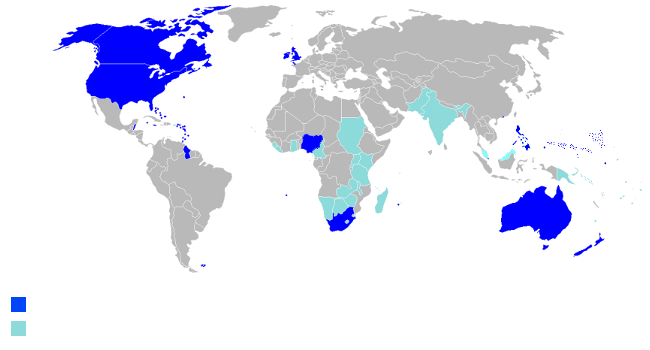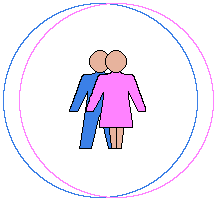
Ch03: Footnotes
The Lunar Cycle
Ancient Texts
Bible Anomalies
The Gospel
Tax & Tithing
Holy Spirit
Fuzzy Overview
Language Barrier
Life After Death
Human Destiny
Religon/Disclaimer
Salvation
Tick-Box Forms
Vida Após da Morte
Different languages are not just different ways of coding meanings into sounds and signs. They are also different ways of looking at the world. These give rise to different values, philosophies, beliefs and ideals, which make perfect mutual understanding fundamentally impossible.
People express themselves ultimately in terms of — and by reference to — familiar objects and experiences. But what is familiar to each of us depends on many things. It depends on what part of the world we live in. Its topology — whether it be flat or mountainous. The vegetation that grows there. The animals that live there. The climate. The local language, culture, traditions and industries. It also depends significantly on our placing within the society in which we live. Whether we are rich or poor determines how much of the world we are able to experience. It also determines the extent to which we are able to participate in that society both economically and culturally.
These basic personal experiences provide the vast vocabulary of notions from which we form and shape our thoughts and construct our analogies and figures-of-speech. They are the essence of language, which is itself the fundamental vehicle through which we communicate. But because each of us necessarily has slightly different experiences, each of us in effect speaks a slightly different language. People whose basic experiences are very different speak very different languages, even if they all speak in English. This is evinced by the very different constructs used by English speakers in India and the United Kingdom.
Going to the ultimate extreme, it is evident that an English speaker does not see life, the universe and everything in anything like the same way as does a speaker of an Aboriginal language. They parse and classify what they see and feel about the world according to entirely different criteria.
 The ancient belief is that divine intervention at the Tower of Babel divided the speech of mankind into different languages. However it may have happened, the language barrier is probably the only significant force that is preventing any one socio-economic ideology from taking over the entire world. A nation's language gives its population an outlook that is different from that of other nations. It imbues it with its own unique culture, traditions, values, tastes and styles. The language barrier hereby ensures that the nations of the world will always be beset by some degree of mutual misunderstanding. But will this situation last?
The ancient belief is that divine intervention at the Tower of Babel divided the speech of mankind into different languages. However it may have happened, the language barrier is probably the only significant force that is preventing any one socio-economic ideology from taking over the entire world. A nation's language gives its population an outlook that is different from that of other nations. It imbues it with its own unique culture, traditions, values, tastes and styles. The language barrier hereby ensures that the nations of the world will always be beset by some degree of mutual misunderstanding. But will this situation last?
The English language is rapidly becoming a global means of communication. The map below shows the countries where it is now the official language.

It is also fluently spoken by a great proportion of the populations of countries where it is not the native or official language. Perhaps, one day, the whole world will speak English and we will all understand each other perfectly. Or will we? I think not.
It is already well evident that as English is growing in its global coverage, it is at the same time diversifying. People in different English-speaking countries are developing different vocabularies and expressions. For example Americans use many figures of speech that are utterly meaningless to anybody outside the USA. Throughout the world, accents and dialects have already become so diverse that on many BBC news items they need to show sub-titles in order to convey what a native English speaker in one country is saying to native English speakers of other countries.
If, eventually, all the world were to speak English then English itself would, without doubt, diversify into the same myriad of mutually incomprehensible dialects that would eventually become just as many separate languages again. Even within the same country, people in cities speak a different version of English from those down on the farm. And this fragmentation of language is not only geographic. Different trades, professions and social groups develop their own jargons or sub-languages that are all but incomprehensible to outsiders. Just listen to the local teen-speak or look at a legal contract or the comment lines in a computer program.
Talking of computer programs, programming languages, such as C and Java, follow a rigorous structure with no irregularities. Programmers are not free to develop a local dialect or introduce colloquialisms in C or any other programming language. If they try, their programs simply will not function. So could not the same rigour be applied to a spoken language? It has been done.
 An artificially constructed language called Esperanto was proposed by L. L. Zamenhof in his book Unua Libro in 1887. Today there are many throughout the world who speak and promote this language. But, if Esperanto were to be universally adopted as the global language, would it be able to maintain its perfectly regular verbs and nouns with no exceptions or local colloquialisms or regional variations?
An artificially constructed language called Esperanto was proposed by L. L. Zamenhof in his book Unua Libro in 1887. Today there are many throughout the world who speak and promote this language. But, if Esperanto were to be universally adopted as the global language, would it be able to maintain its perfectly regular verbs and nouns with no exceptions or local colloquialisms or regional variations?
I fear that it would not. Lazy pronunciation plus figures of speech created from topical jokes and events would all too quickly introduce irregularities and variations. I remember being shocked and disappointed at school when I first started learning Latin. I had anticipated that this mother of all occidental languages and custodian of science and intellect of the past would be a lot more logical, regular and methodical than I discovered it to be. Esperanto may have been methodically designed. However, once released into general use, I don't think it would survive corruption and distortion any better than any other language. People will simply use and abuse it as normal. Esperanto will not escape the power of the Tower of Babel.
Esperanto is a rule-obeying amalgam of existing natural languages, predominantly Spanish. It therefore suffers the weak logic of evolved grammars. Another artificial language, called Lojban, has been designed to have a strongly logical grammar with a simple rigorous syntax. Its sentences (or statements) look to me like extended Unix commands. Lojban is thus bulletproof against colloquialisation or dialectification. The problem with Lojban, for me, is that its beautifully logical form is completely unlike that of a natural language and is therefore completely unlike anything that the uninitiated would recognise. Consequently, its adoption has been scant.
But what causes this Tower of Babel phenomenon? Why should an intact language spread around the world only to fragment into a vast number of mutually incomprehensible sub-languages, dialects, jargons and group-speaks? And how small do the fragments get within which perfect mutual understanding can be maintained?
 The answer lies within a fundamental property of the universe. It is that no two objects can occupy the same space at the same time. On its epic voyage from birth to death, each human consciousness is thereby constrained to travel a unique path through time and space. This, in consequence, mandates that no two individuals can ever occupy the same position in the social order, each lifetime comprising a unique set of situations and circumstances. Each thus experiences life differently. Consequently, the fine detail of each person's philosophy, values, beliefs and ideals is, to at least some extent, different.
The answer lies within a fundamental property of the universe. It is that no two objects can occupy the same space at the same time. On its epic voyage from birth to death, each human consciousness is thereby constrained to travel a unique path through time and space. This, in consequence, mandates that no two individuals can ever occupy the same position in the social order, each lifetime comprising a unique set of situations and circumstances. Each thus experiences life differently. Consequently, the fine detail of each person's philosophy, values, beliefs and ideals is, to at least some extent, different.
Experience, situations, circumstances, philosophy, values, beliefs and ideals are what gives meaning to the words of one's native language. Since these, as a set, are unique for each individual, then we each, at least in part, speak a different language. The precise meaning I attach to each word of the English language is different from the precise meaning you attach to the same word — however slight the difference may be. Each therefore speaks a unique personal sub-language. Hence, fundamentally, one can never understand perfectly what another says.
So how small does the social fragment get where perfect mutual understanding can be maintained? One! You can only understand perfectly what you say to yourself. This can be illustrated by examining the difference in the mental concept invoked within a woman's mind, as opposed to a man's mind, by the word "man". And also, conversely, by the word "woman".

 Within the woman's mind, the word "man" will invoke feelings that are maternal, fraternal, romantic, erotic and perhaps even antagonistic. However, all these will be semantically different from the paternal, fraternal, collegiate and even aggressive feelings that the word "man" invokes within the mind of a man. Conversely, correspondingly different feelings are invoked when each thinks of the word "woman". The notions and precise nuances of meaning invoked by many words are radically different within the minds of men as opposed to the minds of women.
Within the woman's mind, the word "man" will invoke feelings that are maternal, fraternal, romantic, erotic and perhaps even antagonistic. However, all these will be semantically different from the paternal, fraternal, collegiate and even aggressive feelings that the word "man" invokes within the mind of a man. Conversely, correspondingly different feelings are invoked when each thinks of the word "woman". The notions and precise nuances of meaning invoked by many words are radically different within the minds of men as opposed to the minds of women.
This is clearly evinced by the amount of misunderstanding that occurs in the closest of all human relationships, namely marriage. Simple observations of human society demonstrate that any particular word — whether it denote a person, object, action or event — invokes a somewhat different notion in different individuals. Hence, however slightly, we all speak a different language. Therefore we can never quite understand each other perfectly. So if each speaks a different language, how is it possible for human beings to relate at all? The answer is overlap.
 The language of each individual may be unique. Nevertheless, it can overlap considerably with the languages of others. This occurs because the languages, experiences, situations, circumstances, beliefs, philosophies, values and ideals of different individuals share much in common. However, these also necessarily contain mutual differences. The languages of different individuals, therefore, can only ever overlap: they can never coincide completely. How much one can understand another consequently depends on the extent to which their personal languages overlap.
The language of each individual may be unique. Nevertheless, it can overlap considerably with the languages of others. This occurs because the languages, experiences, situations, circumstances, beliefs, philosophies, values and ideals of different individuals share much in common. However, these also necessarily contain mutual differences. The languages of different individuals, therefore, can only ever overlap: they can never coincide completely. How much one can understand another consequently depends on the extent to which their personal languages overlap.
Overlap facilitates communication. Differences provide something about which to communicate. Overlap provides the link. Differences provide the content. The extent of the overlap in language, values, philosophy, beliefs and ideals between two individuals determines the bandwidth (or dynamic capacity) of the channel through which they can communicate. The differences in detail between the experiences, circumstances and situations of two individuals determines the richness of the content of their communication. Both together determine the depth to which their relationship can potentially develop.
![]() A relationship is a binary concept. It exists — and can only exist — between a pair of individuals. Each individual, on the other hand can be one half of many different relationships. Some will be intimate and strong. Others will be casual and superficial. He will normally also have many other relationships that fall somewhere within the continuum that joins these extremes.
A relationship is a binary concept. It exists — and can only exist — between a pair of individuals. Each individual, on the other hand can be one half of many different relationships. Some will be intimate and strong. Others will be casual and superficial. He will normally also have many other relationships that fall somewhere within the continuum that joins these extremes.
 The small group of people with whom one directly relates is referred to as one's coterie. Consistency of language is maintained within a person's coterie by the regular direct contact that is free to take place between the individual and the other members of his coterie. The size limit of a person's coterie (i.e. the number of people with whom he is able to maintain a direct relationship) is restricted by the physiology of the human brain to about 150 members. The depth or intimacy of these relationships follows an inverse square law as one moves from the most intimate of friends towards one's peripheral acquaintances.
The small group of people with whom one directly relates is referred to as one's coterie. Consistency of language is maintained within a person's coterie by the regular direct contact that is free to take place between the individual and the other members of his coterie. The size limit of a person's coterie (i.e. the number of people with whom he is able to maintain a direct relationship) is restricted by the physiology of the human brain to about 150 members. The depth or intimacy of these relationships follows an inverse square law as one moves from the most intimate of friends towards one's peripheral acquaintances.
A person's coterie comprises people he knows directly person-to-person. It can include people whom he has never met in the flesh, such as people with whom he converses via the Internet. However, relationships with such virtual contacts, though there may be a strong link of common interest, lack the long-term robustness of face-to-face relationships.
Beyond his coterie of personal relationships, a person relates collectively. In other words, rather than forming a relationship with another person, he forms a relationship with a group of people, without necessarily knowing personally any particular individual within that group. Such a group can be geographic comprising those who inhabit his city, county or country. Or it can be based on common interests or values such as those who share his hobbies, ideology or social class. All these together form a super-group known as the society of his nation or country.
National identity is brought about by the interaction of two opposing mechanisms. On the one hand, the individual is relatively isolated from the majority of the people of his nation because he simply does not have the cerebral capacity to know them all as individuals. On the other hand, a sufficiently strong connective force is provided by the fact that his personal coterie includes individuals whose coteries include individuals that are beyond his own. In other words, he will always know somebody who knows somebody who knows somebody ...
A person's collective relationship with his nation is much more superficial than a personal relationship with a member of his coterie. Nevertheless, at the national level, the relationships individuals have with society and nation are sufficient to maintain the common language and culture.
The great geographic barriers of the Earth like oceans, mountains, deserts and sheer distance cause a far greater degree of isolation between nations. This results in much lower coupling between their respective societies, cultures and languages, leaving them to evolve independently along different lines. The experiences, situations and circumstances of individuals in different nations thus share far less in common.
The thoughts of a speaker, expressed in terms of experiences, situations and circumstances which his listener does not share, cannot be communicated. Both speaker and listener may even be using the same vocabulary, grammar and syntax, but the notions and concepts carried by them can never be quite the same. This is particularly the more so if the listener is hearing a translation of what the speaker says. The semantic keys with which they unlock meaning from the syntax are subtly different, so the one cannot fully and accurately understand the other. Worse still, the listener may think he understands when he has misunderstood.
This process constantly frustrates all human attempts at global unification. The diversity of language guarantees the permanent separation of nations. The Tower of Babel is ever-present, exerting its force of fragmentation over human language.
 This is why the nations of the world can never quite see eye-to-eye. It is why a government can never really know its citizens. It is why the rich can never understand the poor. It is why capitalists can never agree with socialists. It is why men cannot understand women. It is the cause of every schism between ideologies, nations, professions and social classes. But it doesn't have to be this way. Nevertheless, to change it would require much effort. A meeting of minds necessitates a conscious determination to bridge the gap between people of different backgrounds.
This is why the nations of the world can never quite see eye-to-eye. It is why a government can never really know its citizens. It is why the rich can never understand the poor. It is why capitalists can never agree with socialists. It is why men cannot understand women. It is the cause of every schism between ideologies, nations, professions and social classes. But it doesn't have to be this way. Nevertheless, to change it would require much effort. A meeting of minds necessitates a conscious determination to bridge the gap between people of different backgrounds.
But do we really want or need to achieve a universal language that would facilitate perfect understanding between all human beings on the planet? Would humanity benefit from this? I think not. The natural automatic localised fragmentation of language, which I call the Tower of Babel effect, protects us. It acts like the moderating carbon rods in an atomic fission reactor, which stifle the uncontrolled chain reaction that would result in catastrophic melt-down. If a single perfect language united all humanity, a monolithic Draconian hierarchical world order would undoubtedly form that would plunge the whole planet into unbearable servitude. It would be a global version of Fritz Lang's "Metropolis". The present order is by far the better option.
So should things stay the way they are, with international misunderstandings and wars? No! Let the moderating effect of language difference remain. But change the protocol whereby we relate with each other. First, accept difference. Rejoice in the variety it creates. No nation must forcibly try to impose its ways on others.
Reject the excessive specialisation forced upon us by industrial free market capitalism. Seek a greater overlap in knowledge and experience to create a more common frame of reference through which to understand each other. For this we need a different kind of social structure that facilitates inter-personal relationships that are sufficiently intimate and robust to be able to resist and thwart all attempts by any external collective force to sever them.
Parent Document | ©Sep 1995, Sep 2010 Robert John Morton